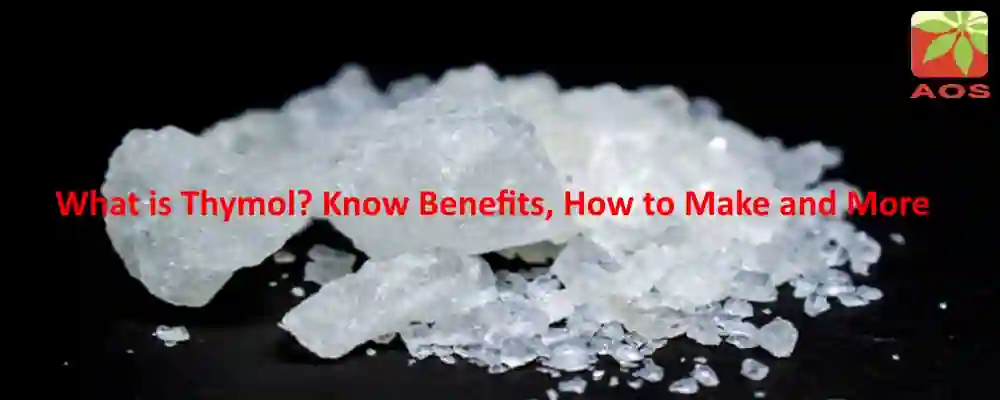
What is Thymol? Know Benefits, How to Make and More
Thymol, C10H14O, is a naturally occurring monoterpenoid phenol derivative of p-Cymene that is isomeric with carvacrol. It is obtained from Thymus vulgaris, ajwain, and numerous other plants as a white crystalline material with a strong antiseptic scent. Thymol is found in oil of thyme.
How to Make Thymol Crystals?
We AOS Products Private Limited are one of the trustworthy Manufacturers of Pure and Natural Thymol in India. And we use one of the best industrial processes “solvent extraction” to obtain 100% finest quality of the crystals from thyme oil.
Thymol Crystals are a white, crystalline material with a nice aromatic smell that is extracted using the solvent extraction method from the leaf of Thymus vulgaris and numerous other plants.
How to Use for Numerous Disease:
Let's examine how these elements are advantageous for various applications of thyme oil.
1. Acne: There is some proof that thyme oil works to lessen acne-causing germs on the skin Trusted Source. Oregano oil outperformed thyme oil in a study on animals that tested the two oils' abilities to get rid of germs.
2. Areata alopecia: Thyme oil can be used as a treatment to stop hair loss when combined with other essential oils, a carrier oil, and massage. Dependable source.
The effectiveness of thyme oil for this condition is currently unknown, however, anecdotal evidence suggests that a mixture of essential oils that contains thyme oil may be a successful treatment.
3. Breast Cancer: According to a very early investigation, wild thyme extract may eventually show potential in the fight against breast cancer.
4. Respiratory Tract Infections and Coughs: It is believed that the thymol in thyme oil has antispasmodic effects. Thyme essential oil has been demonstrated to be efficient at reducing coughs and the length of respiratory tract infections, such as the common cold when combined with primrose.
5. Preservative for Food: Thyme oil was discovered to be efficient at getting rid of food-related germs and fungi in a study that was published in the Journal of Medicine and Life Trusted Source.
Researchers have discovered that the antibacterial properties of thyme and thymol work against germs like salmonella, Staphylococcus aureus, and Helicobacter pylori.
6. Heart Condition: A 2010 laboratory study indicated that the carvacrol in thyme oil was an efficient anti-inflammatory agent with car radioprotective properties, making it potentially advantageous for people with heart disease. The study was published in the Journal of Lipid Research Trusted Source.
7. Oral Fitness: The anti-inflammatory properties of thymol have been proven in numerous investigations. Thyme oil's thymol is useful for lowering infection and inflammation.
Thymol is advantageous for dental health, according to new studies, because of its anti-inflammatory and antibacterial qualities. Several dental products, notably Listerine Cool Mint mouthwash, contain the substance.
Pharmacological Properties and Molecular Mechanisms of Thymol:
Traditionally it is used as multipurpose medicine due to its various pharmacological properties including analgesic, antitumor, antispasmodic, antioxidant, and free radical scavenging, anti-fungal, antiseptic, anti-inflammatory, and antibacterial activities.
A drug's permeability, chemical makeup, half-life, molecular weight, and mechanisms of action through the routes it influences.
Thymol's main anticancer strategies include the activation of apoptosis, anti-proliferation, blockage of angiogenesis and migration, as well as the reduction of tumorigenesis through control of the activity of enzymes that break down carcinogens.
Benefits of Thymol, and How to Use?
Numerous studies have shown that thyme essential oil has the power to, among other things, lessen inflammation in the body, improve heart health, and diminish or eliminate foodborne pathogens.
It's crucial to understand that there is no proof that thyme oil used alone would treat any specific condition before you run out and buy a bottle.
Thyme oil is now believed to be useful when taken as a component of overall therapy programmers, rather than as a stand-alone treatment or cure, although additional research is required.
Several healthy components can be found in thyme oil. These substances consist of:
• carvacrol
• thymol
• linalool
• cineol
• camphor
• borneol
Know About Essential Oils and Buy Online
Thymol Uses in Pharma, Food and Cosmetic Industries:
We AOS products manufacture Thymol Crystals BP Grade and supply it to 3 Emerging industries of FMCG, for example, we supply to Food, Pharma and Cosmetic Industries.
In Pharma Industry:
Thyme has strong antibacterial, anti-fungal, antivirotic, expectorant, antispasmodic, sedative, antiseptic, antioxidant, carminative, and diaphoretic properties.
In Food Industry:
Thymol has been shown to exhibit an antiseptic property that is 30 times higher than that of other phenol compounds and contributes to the antibacterial activity of thyme EO. These substances exhibit bioactivity against pathogenic microorganisms and food spoilage microflora, as well as antifungal and antibacterial properties.
In Cosmetic Industry:
More importantly, thymol, an essential oil derived from the thyme plant, shows to be far more compatible with skin cells than certain commonly used antibiotic medications and chemicals. Thymol has exceptional antibacterial characteristics.
Side Effects thymol, Is Thymol Safe or NOT?
You can also be allergic to thyme and thyme oil if you have a mint allergy.
Thyme oil side effects have included:
• dizziness
• Allergy symptoms, such as hay fever and contact dermatitis
• conjunctivitis
• muscular weakness from asthma
• headache
• stomach discomfort and irritability
Thyme oil should not be consumed or applied topically undiluted. Before using thyme oil, especially if you're pregnant or nursing, see your doctor.
Thyme oil shouldn't be administered to kids. When diffusing essential oils, keep in mind that kids and animals might be sensitive to the oil.

